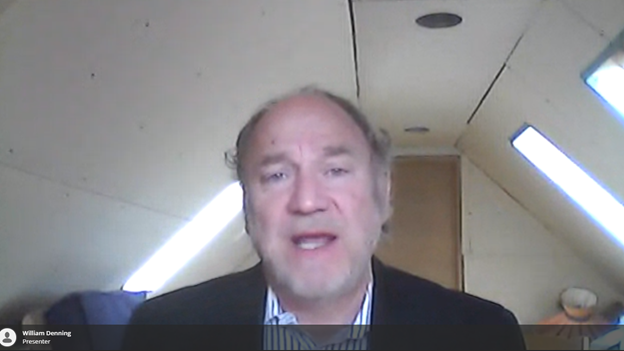
Transportation management consultant William Denning presented “How will economics figure in your engineering career?” for the UT-ITE seminar series on March 26, 2021.
Denning opened his seminar by saying, “I want to talk about transport economics – that’s what I do – and how does it figure into your careers as engineers?”
To demonstrate the value of economics proficiency to engineers, he posed a realistic scenario:
An economist pronounces your project “uneconomic.”
What does it mean? What do you do?”
He went on to discuss how the disciplines of engineering and economics interact, and explained fundamental economics concepts before presenting examples of using economics in some contemporary issues.
Engineers and economists are always working together, in different roles, on a project team. Generally, the economists are interested in the demand, the cost, the price, and what should be built (allocative efficiency). Engineers look at operating costs, technologies, practices, and how something should be built (productive efficiency). Private and public sector projects use economics differently; public sector projects generally start with economic analysis to evaluate overall social benefit before doing financial analysis.
Economics are not to be confused with private profit.
Denning presented a general evolution or history of science through the past five centuries. He says that we are now in the era of sustainable development, which has three pillars – society, economics, and ecology – and that all three are necessary to provide an integrated lens on development activities to ensure that they are sustainable.
As the world’s population grows larger and more prosperous, more efficient transportation is critical, says Denning, in order to limit carbon emissions and prevent global warming.
Continuously higher efficiency in transportation services is an absolute requirement. We cannot afford inefficient investment.
Economics is sometimes called the “dismal science” because it requires us to think about the implications of our choices. In short, economics looks at:
- resources;
- how to manage resources to achieve a desired result; and
- how the benefits of economics activities are distributed across society.
Denning went on to explain many economics concepts useful to engineers, such as supply and demand, macro and micro economics, economic and financial Cost Benefit Analysis (CBA). He also discussed the importance of travel demand models, network-wide travel demand forecasting, optimization, and more.
UT-ITE President Mostafa (Yaser) Kouchakzadeh moderated Q & A following the seminar.
- View William Denning’s presentation file PDF.
- Watch the presentation video recording on YouTube: “How will economics figure in your engineering career?” William Denning, March 26, 2021.
Abstract
This presentation outlines a framework for economics in the transport sector and for transportation planning. It develops microeconomic applications for project or program evaluation, looks at current practice in transportation economics, and seeks to answer the question, “How will economics figure in your engineering career?”
About the speaker

William Denning has worked in transportation most of his academic and professional career. He earned a BA in Geography and in Economics from the University of Toronto in 1977 and an MA in Regional Science from the University of Pennsylvania in 1980. He has worked for Ernst & Young, the Canadian Foreign Service, Canadian Pacific, GO Transit, the World Bank, the Ontario Ministry of Finance, and the Ontario Ministry of Transportation. In his later career with the Ontario government Denning was involved in the creation of Metrolinx, Infrastructure Ontario, the Move Ontario Trust (which funded the provincial contribution to the Spadina Subway extension), and managed MTO’s Transportation Economics Office. He draws best practice examples largely from his World Bank experience. He is currently semi-retired and provides selective consulting services to a variety of clients. More detail is available from his LinkedIn profile, which also includes his opinions on contemporary transportation issues.
Presented by University of Toronto ITE Student Chapter, UT-ITE.
